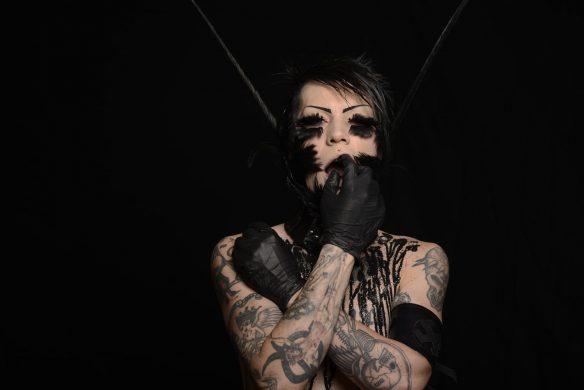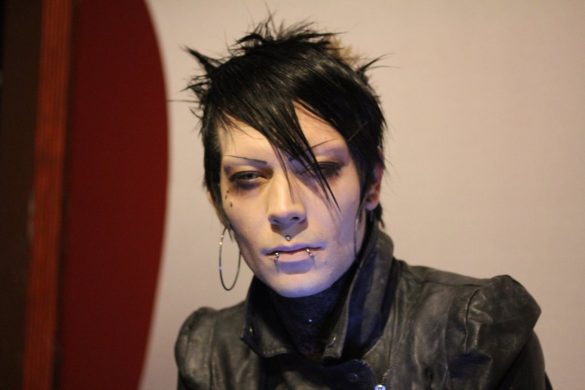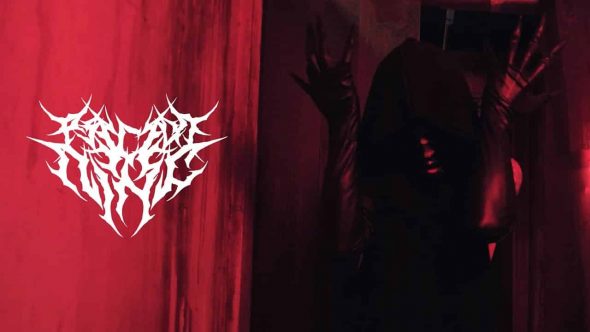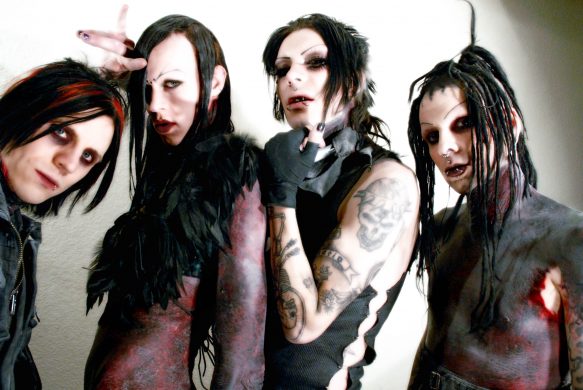[ SCROLL DOWN FOR ENGLISH VERSION ]
Sunkios muzikos grupė iš Kalifornijos, savo kūryboje maišanti tamsią elektroniką ir metalą, per eilę metų užsitarnavo visuotinį tamsių garsų entuziastų pripažinimą visame pasaulyje. Prieš 15 metų tai buvo viena unikaliausių tamsų EBM stilių grojančių komandų žanre, pastarąjį dešimtmetį, grupė bene įdomiausiai kombinuoja industrial ir metalo garsus. Visai neseniai jie išleido naujausią savo įrašą “Less To Heaven”. Privalu pasidžiaugti, kad grupės vokalistas ir idėjinis vedlys Nero Bellum neįtikėtinai lengvai sutiko duoti interviu Ore.lt portalui, o į klausimus atsakė per rekordiškai trumpą laiką. Dėmesio, jūsų akivaizdoje vienintelis lietuviškas interviu su šiais unikaliais tamsuoliais iš Amerikos. Atsiverkite ir skaitykite!
Visų pirma, ačiū, kad sutikai atsakyti į klausimus! Visai neseniai išleidote jau 7-ąjį pilnagrojį Psyclon Nine albumą “Less To Heaven”. Kokie atsiliepimai? Kuo, tavo nuomone, šis albumas išsiskiria nuo ankstesnių grupės opusų? Kokia pagrindinė albumo tema?
Nekreipiu daug dėmesio į žmonių atsiliepimus, kai išleidžiu naują muziką, tačiau atrodo, kad fanams albumas patinka. Kiekvienas įrašas yra vis kitoks nei ankstesni, todėl, manau, kad mūsų fanai yra įpratę su kiekvienu albumu išgirsti kažką naujo. Kokia yra albumo tema? Aš siuvu žaizdas. “Less To Heaven” būtų galima pavadinti dienoraščiu. Su šiuo įrašu leidžiu fanams geriau mane pažinti.
Buvau nustebęs, kad su naujuoju albumu jau išleidote 2 video klipus – “Money And Sex And Death” ir “See You All In Hell”. Spėju, kad grupė gavo didesnį biudžetą? Ar vis dėlto yra kita priežastis? Kiek pamenu, iki šiol Psyclon Nine teturėjo vieną klipą, kūriniui “Parasitic” (iš albumo “Crwn Thy Frnicatr” (2006)).
Tiesą sakant, praeityje esame padarę daugiau klipų, tačiau tai niekada nebuvo mūsų prioritetas. Nufilmuoti klipus naujausiam albumui atrodė teisinga, o savo menui norėjau suteikti daugiau gelmės, pavaizduoti vizualinę ir garsinę estetiką.
Kaip tavo modulinių eksperimentų fanas, privalau paklausti – kaip susidomėjai moduliniais sintezatoriais? Ir kiek laiko juos naudoji Psyclon Nine muzikoje?
Visuomet mėgau unikalius instrumentus. Nuo pat projekto gimimo, naudojau įvairius sintezatorius, samplerius ir būgnų mašinas. Su kiekvienu albumu panaudodavau naujus instrumentus ir ieškodavau naujų garsų. Savo pirmąją modulinę sistemą pradėjau dėliotis apie 2013-uosius. Man patiko neribotos modulinio garso galimybės bei idėja, kad galiu sukurti tokius garsus, kurių neįmanoma atkartoti.
Kokia buvo idėja sukurti savo asmeninį projektą, kaip Nero Bellum, kartu su moduliniais sintezatoriais? Ar tai gimė iš eksperimentų, kurie netiko Psyclon Nine temoms?
Mano solo albumai nesusideda iš dainų. Tai yra momentai, mano nuomone nuostabūs ir įdomūs, kuriuos pagavau eksperimentuodamas su garsais. Neturėjau jokių planų įterpti šiuos eksperimentus į Psyclon Nine, nes tai tėra garsų paieškos. Pavieniai garso koliažai.
Esi žinomas dėl savo unikalios išvaizdos. Kokia prasmė tau asmeniškai yra atrodyti taip, kaip atrodai? Ar manai, kad ekstravagantiškas įvaizdis yra svarbus atliekant tokią muziką?
Aš apie tai negalvoju. Tiesiog, taip jaučiuosi patogiai.
Ar galėtum įvardinti keletą inspiracijų, kurios yra svarbios Psyclon Nine muzikai ir estetikai?
Dažniausiai įkvepia mano ankstesnė kūryba ir tai, kaip noriu nuo jos nutolti bei elementai, kuriuos noriu išsaugoti. Nenoriu per daug atsiverti šiuo klausimu, nes man svarbu, kad viskas ką darau, būtų autentiška.
Viename interviu esi sakęs, kad pirmieji P9 albumai “Divine Infekt” (2003) ir “INRI” (2005) tau tėra demo įrašai. Ar vis dar sutiktum su šiuo pareiškimu? Man tai atrodo šiek tiek keista, nes “INRI” albumą laikau įspūdingu ir įkvepiančiu įrašu net ir šiandien.
Sutikčiau. Manau, kad tuo metu dar nebuvau atradęs savo skambesio. Pradėjau kurti “Divine Infekt” būdamas vos paauglys, vis dar besimokantis programuoti sintezatorių. Galiu mėgautis tais albumais, tačiau daugeliu atvejų, manau, kad jie nereprezentuoja manęs, kaip kūrėjo.
Galėtume sutikti, kad Psyclon Nine skambesys, bėgant metams, pakito, ypač su albumu “We The Fallen” (2009). Kokia buvo priežastis, paskatinusi pakeisti skambesį? Galbūt pastebėjai, kad tuo metu EBM žanras buvo ganėtinai nuvalkiotas?
Niekad neturėjau poreikio įbrukti save į kažkokį žanrą ar konkuruoti su kitomis grupėmis. Garsas evoliucionavo natūraliai ir su kiekvienu albumu aš bandau įgyvendinti vis kitokią viziją.
Psyclon Nine tikrai nėra nauja grupė. Per ilgus metus išleidote nemažai puikių albumų, turite galybę lojalių fanų visame pasaulyje, o jūsų muzika tikrai yra unikali žanre. Bet, visgi, Psyclon Nine išliko undergrounde. Ar specialiai stengiatės netapti meinstrymu?
Neturiu nieko prieš populiarias grupes. Puikiai žinau, kad tai, ką darau gali netikti masėms, tačiau savo muziką, visų pirma, rašau sau ir niekad negalvoju apie jos kelionę po išleidimo. Man malonu žinoti, kad tiek daug žmonių mėgaujasi Psyclon Nine. Tai tiesiog įrodo, kad yra galybė panašių žmonių.
Kaip įvyksta Psyclon Nine kūrybinis procesas? Kiek žinau, pagrindinis (ir, galbūt, vienintelis?) kūrėjas grupėje esi būtent tu?
Daugelis dainų gimsta eksperimentuojant. Tarkime, eksperimentų su moduliniu sintezatoriumi, būgnais ar gitaromis, kai užčiuopiamas norimas garsas, sąskambis ar rifas, metu gali gimti idėja. Galiausiai, visa tai yra eksperimentavimas. Niekada nenorėjau išleisti albumo, kuris pilnas vienodai skambančių kūrinių. Man taip nepatinka.
Ką tau reiškia gyvi koncertai? Ar tai yra lygiai taip pat svarbi P9 dalis, kaip ir įrašai? Ko žmogus gali tikėtis iš Psyclon Nine pasirodymo?
Gyvi koncertai turėtų būti vizuali muzikos reprezentacija. Tai man yra itin svarbus aspektas, o kurdamas muziką visuomet galvoju apie tai, kaip ji nuskambės pasirodymų metu. Tai tokia katarsio pilna patirtis tiek muzikantams, tiek ir fanams. Galima būtų tai pavadinti ritualu ir galimybe priartėti prie muzikos drauge su fanais.
Ar galėtum paaiškinti grupės simbolio “Pentahazard” reikšmę? Ką tai simbolizuoja?
Tai yra žvėries ženklas.
Koks tavo santykis su kvaišalais? Ar manai, kad jie yra svarbus elementas kūrėjui? Ar jie atlieka kokią nors rolę tavo gyvenime?
Daugybę metų esu blaivas, tačiau taip nebuvo visuomet. Manau, kad kvaišalai gali turėti prasmę, tačiau jų naudojimas turi savo kainą.
Koks yra tavo santykis su religija? Ypač, krikščionybe. Ką tai tau reiškia? Ar vis dar verta prieš tai kovoti?
Neturiu jokio santykio su religija. Kiek man žinoma, religija yra nuodai, kurie iš esmės neleido žmonijai, kaip rūšiai, natūraliai progresuoti. Džiaugiuosi, kad gyvenu tais laikais, kai dievo koncepcija nebėra svarbi
Kokią grupės ateitį matai? Ką dar norėtum pasiekti? Ar turi svajonių bei vizijų apie tai, kaip, tarkime, Psyclon Nine atrodys po 10 metų?
Apie tokią tolimą ateitį negalvoju. Šiuo metu dėliojuosi spalio mėnesio turo planus ir rašau medžiagą sekančiam albumui. Noriu toliau eiti keliu, kurį pradėjau su “Less To Heaven” įrašu ir naviguoti neatrastose teritorijose.
Ar galėtum papasakoti apie savo mėgstamus filmus, knygas ar kažką, ką mėgsti veikti? Ar turi kitokių, su muzika nesusijusių, hobių savo gyvenime?
Myliu 90-ųjų Grego Araki filmus, tokius, kaip “Doom Generation”, “Nowhere” ir t.t. Pastaruoju metu skaitau daug Christopher Hitchens ir Lawrence Kraus autorių kūrinių. Dėl hobių, kurie nėra susiję su muzika, galiu pasakyti tiek, kad apie 20 metų esu veganas ir mėgaujuosi maisto ruoša. Pastaruoju metu ir vėl pradėjau tapyti, kas vėlgi atnešė įdomių rezultatų.
Internete:
instagram.com/nero_bellum_official
[ ENGLISH VERSION ]
First of all, thank you for agreeing to do this interview! You just released a 7th full length album with Psyclon Nine entitled “Less To Heaven”. How is the response so far? How does this album differ from your older ones in your opinion? And what is the central theme of this album?
I don’t pay much attention to the response when I release new music, but it seems overall that fans have been enjoying it. Each album is a departure from the last so, I think that our fans expect to hear something different with each release. Regarding the theme? I’m suturing wounds. LESS TO HEAVEN is a diary of sorts. I’m letting the fans get a little closer to me.
I was surprised by the fact that already you produced 2 video clips with the newest album – “Money And Sex And Death” and “See You All In Hell”. I presume that the band got a bigger budget or what was the reason for it? As far as I can remember, the only video clip of Psycon Nine before was “Parasitic” (from the album “Crwn Thy Frnicatr” (2006)).
We’ve done more videos in the past. It was never a priority. It felt right. I wanted to give more depth to the art. To showcase the aesthetic visually as well as sonically.
As a fan of your modular experiments, I must ask right away – how did you get interested in modular synthesizers? How long did you use them in Psyclon Nine music?
I’ve always been fascinated with unique instruments. I’ve been using hardware synthesizers, samplers and drum machines since the inception of the project. With each album I incorporate new instruments and search for new sounds. I believe that I started building my first modular system around 2013. The open ended format was very appealing to me as well as the idea that I would be able to create sounds that no other artist could duplicate.
What was the idea to create your own project simply as Nero Bellum with modular synthesizers? Was it a creation that eventually did not fit in Psyclon Nine themes?
My solo albums aren’t comprised of songs. They are moments that I captured when experimenting that I felt were beautiful or interesting. I had no intention of including any of that material in a Psyclon Nine album as, they are simply explorations. Single patches.
You are known for your unique appearance. What is the purpose to you personally to look as you look? Do you think that an extravagant look is important when performing music like this?
It’s not something that I think about. Everyone wakes up in the morning and throws themselves together. This is how I feel comfortable.
Can you list some of your inspirations that are important for the music and aesthetics of Psyclon Nine?
Most of my inspiration comes from my previous work. How I want to depart from it. Elements that I want to hold onto etc. I try not to expose myself to much because it’s important to me that everything that I do is authentic.
In one interview you said that your first two albums “Divine Infekt” (2003) and “INRI” (2005) in your opinion are just demos. Do you still agree with this statement? It sounds strange to me, since I find “INRI ” as an amazing and inspiring album even today.
I do. I feel that I hadn’t found “my sound” just yet when writing those albums. I began Divine Infekt as a teenager who was just learning to program a synthesizer. I can enjoy those albums, but for the most part I don’t feel that they represent who I am as an artist.
We could agree that the sound of Psyclon Nine has changed over the years, especially with the album “We The Fallen” (2009). Why did it change and what was the reason behind it? Maybe you noticed that by that time the genre of EBM was a little overused?
I’ve never had any interest in boxing myself into a genre or competing with other bands. The sound evolved naturally and with each release I attempt to execute a new vision. A more appropriate vehicle.
Psyclon Nine is not a new band, you released amazing albums over the years, you have a loyal fanbase from around the world and your music is unique in the genre. And one can still call Psyclon Nine an underground band. Do you intentionally don’t want to become a mainstream act?
I have nothing against mainstream acts. I know that what I do might not appear to a mass audience, but I write music for myself and don’t give any thought as to how it might go over once released. I’m happy to hear that so many people can relate to and enjoy Psyclon Nine. It only proves that there are a lot of similarly disturbed individuals.
How does the creation process of Psyclon Nine happen? As I know you are the main (and maybe only?) creation force of the band. Tell a little about how P9’s albums are made.
Most songs begin with an experimental process. An idea might come from a patch on a modular synthesizer, I might be running drums through a pedal chain or simply picking up a guitar and stumbling across a riff that sticks with me. In the end it’s all experimentation. I never want to release an album full of songs that sound the same. It’s just not fun for me.
What live performances mean to you? Are live shows an equally important part as the music in the records? What can one expect from a Psyclon Nine show?
The live show should be a visual representation of the music. It’s incredibly important to me and I try to keep the live show in mind when composing the music. The live show is such a cathartic experience for both the artists and the fans. It’s a ritual of sorts and an opportunity to bridge the gap and experience the music together.
Can you tell the meaning of the symbol of the band “Pentahazard”? What does it symbolize?
It’s the mark of the beast.
What is your relation to intoxicants? Do you think that they are an important part for a creator? What role do they play in your life?
I have been sober for many years, but it hasn’t always been that way. I feel that they can have a purpose, but it comes at a price that might not be worth the cost.
Can you talk about your relation to religion? Especially christianity. What does it mean to you? Is it still worth it to rebel against?
I have no relation to religion. As far as I’m concerned religion is a poison that has set us all back as a species. I’m glad to be living in a time where the concept of god is all but relevant.
What future of the band do you see today? What more you would like to accomplish? Do you have any dreams or visions about how Psyclon Nine will look after 10 years or so?
I don’t think that far ahead. Right now I’m considering our October tour and writing for the next release. I want to continue down the path that I’ve begun with Less To Heaven and continue to navigate uncharted territory.
Can you tell me about your favorite movies, books, or anything else that you are a fan of? Do you have some non-music-related hobbies in your life?
I love the 90’s Greg Araki movies Doom Generation, Nowhere etc. I’ve been reading more Christopher Hitchens and Lawrence Kraus lately. And for hobbies not related to music, I’ve been vegan for around 20 years so I tend to enjoy cooking. I’ve been painting again lately which has also been an interesting outlet.




Komentarai